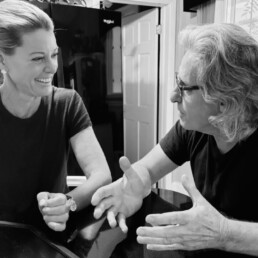What do you do when tragedy befalls you? If you’re Christine Handy, who battled a breast cancer diagnosis, you bravely share your story to as many people as possible so that others may heal through connection. “Honest and courageous storytelling allows others to feel less alone. Sharing stories of great difficulty promotes connectedness,” Handy says in our interview. Handy courageously put her own story into Walk Beside Me, which would become a best-selling novel. Now, she has overseen the adaptation of that novel into a feature film, Hello Beautiful, which she served on as as executive producer.
Cinemacy had the distinct pleasure of talking with Christine Handy as well as Ziad Hamzeh, who wrote the screenplay and directed the film. Read on to learn more about this poignant film, which captures the courage and resilience in the face of illness and despair. Christine and Ziad dive into their shared creative journey, inspirations, and challenges faced in bringing this deeply moving story to the screen.
Christine, what inspired you to adapt your best-selling book Walk Beside Me into this film? What were the earliest challenges you faced during this adaptation process?
Christine Handy: My inspiration to turn my book, Walk Beside Me, into a full feature film came from my own experiences seeking films during my cancer journey. Not only did I become frustrated with books that portrayed a cancer patient’s journey, but I also became more fearful while watching popular cancer films. After completing my chemotherapy, I knew that if I could write the book, I would not stop until a film was made.
Of course, those were just dreams, but if you know me, you will know that I have a lot of grit and determination. I respect “No’s,” but they don’t stop me. The earliest challenges still face me today. I am not in the film industry, so each step of the way has been fraught with uncertainty and tremendous hurdles. But we keep going, especially when it involves helping others.

Ziad, this film, Hello Beautiful, explores themes of courage, friendship, and love amidst tragedy. What excited you about the original story, and what did you want to add to ensure the visual and emotional themes captured the beauty and ugliness of illness and despair?
Ziad Hamzeh: Christine Handy is a remarkable woman, and her story is one of tremendous courage, determination, and love. As I read the novel and developed the screenplay, tears often burned my cheeks, because the emotions were so strong, on so many levels. I was determined to bring to audiences what I found so compelling in Christine’s story. She and her family were tested against the most extreme circumstances, and they did not give up. It was a transformational journey for all of them.
To do justice to their stories, it was important to highlight each characters’ perspective and struggles. I was assisted greatly in this area by our Director of Photography, Terrence Hayes. The visual tapestry he created effectively communicated the contrasts of intimacy, urgency, and vulnerability that mirrored the internal struggles of the main character. Also integral to communicating the emotions visually was our Production Designer, Layla Calo-Baird. She understood that the environment is also a key character in the film. We began at the pinnacle of happiness and success and fell to the depths of hell. The environments she created reflected all of that.
Together, our team created a visually stunning environment that externalized the variety and depth of emotions our characters were experiencing. Finally, the emotional environment was elevated even further by the exquisite compositions of Marco Werba. His music enhances every moment of the film. The collective expertise and tireless efforts of our entire team resulted in the creation of an engaging, heart-felt, and inspiring film.
Christine, could you elaborate on the decision-making process behind selecting Ziad Hamzeh as the director for Hello Beautiful? What qualities did you see in him that made him the right fit for this project?
Christine Handy: Ziad Hamzeh, from our first introduction, has been a champion for this story. It is not because it’s my story, but it is a story for all women that Ziad recognized. Because breast cancer is on the rise, particularly in younger women, I needed a partner that would get through all of the stumbling blocks with me. Ziad, like myself, has a great sense of tenacity and determination to help others. He brings passion to his projects as well as decades of experience. Ziad and I instinctively trusted each other from the beginning. We used the same entertainment lawyer to seal the agreement in 2018 and since that moment, we have not stopped working on this project.
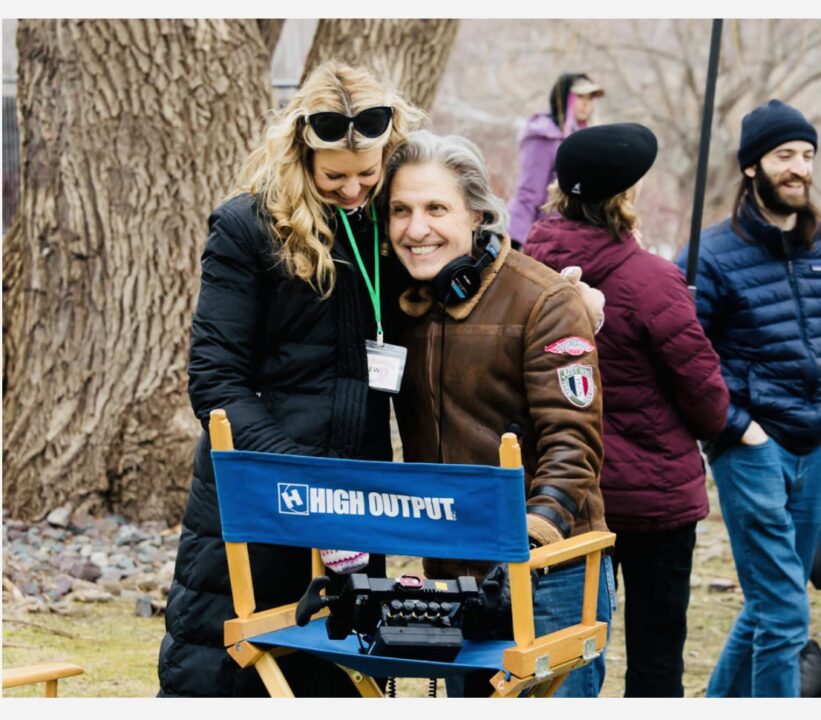
Ziad, Hello Beautiful navigates through emotional and visual chaos while portraying decency in darkness. What early work did you do to conceive these contrasting elements into the visual style of the film?
Ziad Hamzeh: All of my work, both in theater and film, embraces the basic human experience. This requires knowing each character intimately. To accomplish this, I create a unified vision derived from the environment, economic status, and engulfing need of each character. This deep understanding of each character guides the development of the story and maintains consistency and authenticity throughout the project.
Also essential is contrast. I learned early in my career that contrast really matters. Most would agree that without pain, we cannot fully understand joy; and without darkness we cannot fully appreciate the light. It is the contrasts in the characters’ lives that enable us to genuinely understand and connect with them and their experiences.
I take my responsibility very seriously, because actors depend upon the director to ensure their performances deliver truthfulness and authenticity. So it is essential for me to work from a platform where humanity and human experiences are at the center of the story. This approach has always enabled me to deliver honest and compelling stories.
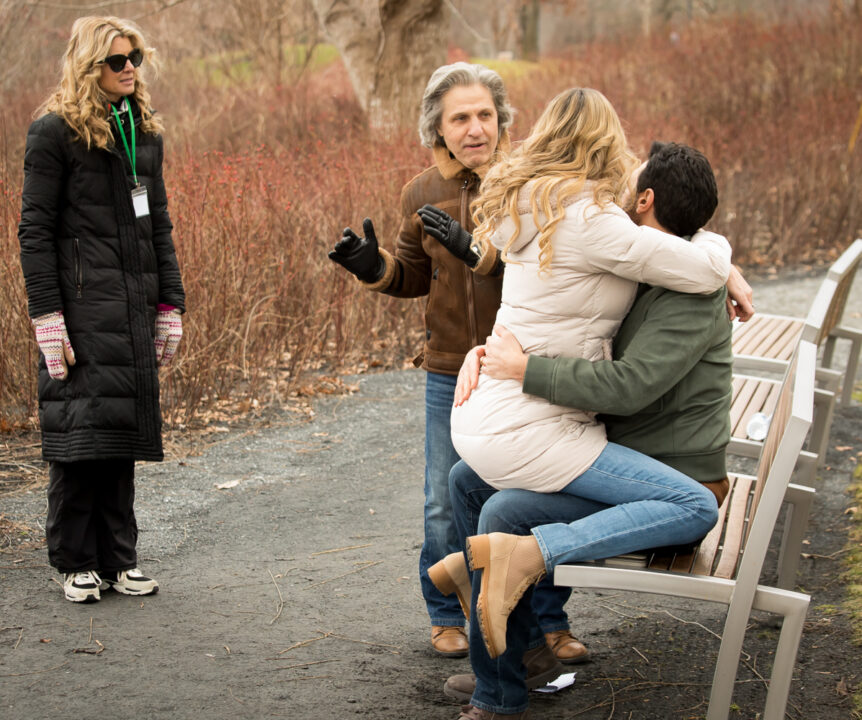
Christine, as someone deeply connected to the story on a personal level, what was it like for you to be on set during the production of Hello Beautiful?
Christine Handy: It was a dream come true to be on set during the production of Hello Beautiful. However, we were not portraying the most flattering parts of my life or the easiest. This film sheds light on the pain that entire families go through during cancer trials, bringing up deep pain. There were a few intense scenes that I purposely did not show up on set for. One scene in particular is still hard for me to watch even though I experienced it ten years ago. When you watch the movie, think of the table scene; that was the day I stayed home.
Ziad, in a film that explores such intimate and challenging themes, how did you work with the actors to bring authenticity and depth to their performances?
Ziad Hamzeh: The intimate and challenging themes in the film required us to explore the story and the characters in a truly honest and authentic manner. Perhaps the best preparation for me relative to supporting the actors’ understanding of the characters and the themes of the story is that I wrote the screenplay. As I did, I felt the characters’ emotions, spoke their words, ached with their pain, and reveled in their joy. So when it came time for me to rehearse with the actors, I had already developed a deep understanding of each character and theme.
Fortunately, our talented cast came well-prepared for their roles. Their skills and professionalism were extraordinary. They had researched their characters, the global crisis of breast cancer, and many other elements. My responsibility during rehearsals was to ensure they came to understand their characters even better than I did. I worked closing with them in a variety of formats and listened attentively to their queries and requests. They prepared diligently and collaboratively and brought their passion for the project to the set every day. Each and every moment of the script was explored, dissected, and questioned in order to deepen the actors’ understanding and thus strengthen their performances.
What were the biggest challenges you each faced while making this movie? What were the most unexpectedly rewarding moments?
Christine Handy: The biggest challenges related to funding and our limited budget. We started production during the strike, which also added to our restraints. Ironically, the most rewarding moments involved the same budgetary constraints that invoked such peril. The slender budget forced each and every person to work harder and with greater professionalism. This elevated the set and brought all of us closer. We all shared an underlying drive to make this film exceptional, even with the restrictions.
Although many of the scenes required intense emotional acting, we did not have time for breaks. Our schedule demanded an intensity that was felt by all. Quite literally, the entire community rose to the occasion. Other unexpected rewards occurred when the actors gave much more than I expected. I cannot wait for the world to see Tricia Helfer’s performance in this movie. There is also a buzz going on about Sara Boustany and Tarek Bishara’s performances as well. The casting for this film is perhaps the greatest reward so far.
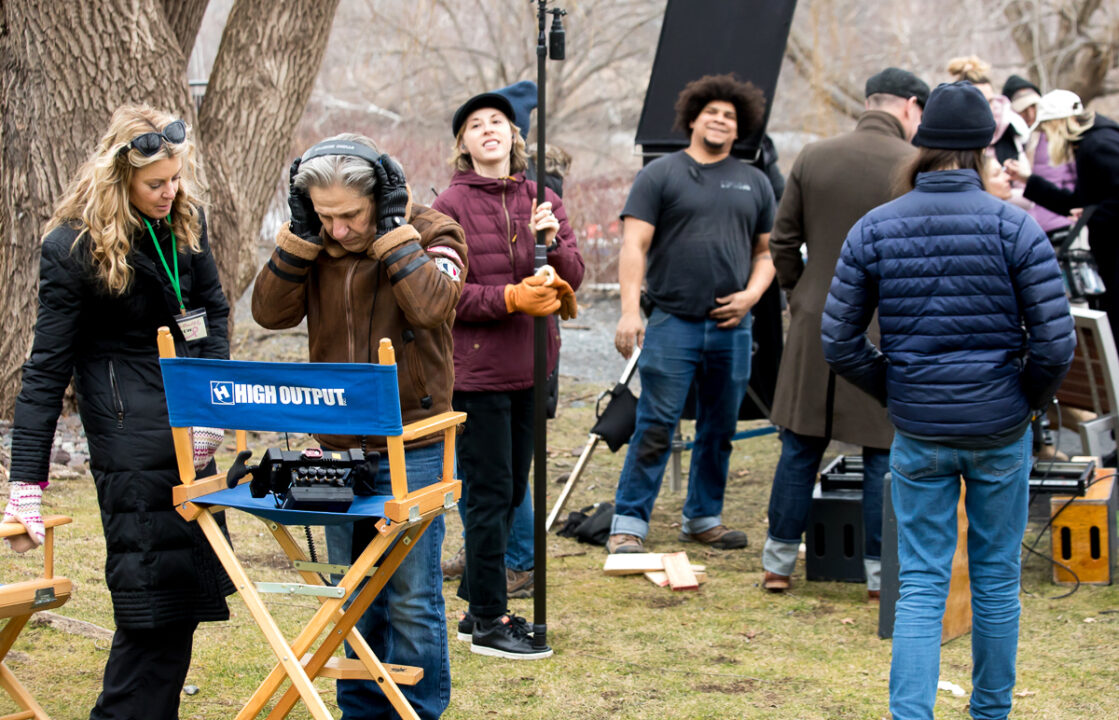
Ziad Hamzeh: Challenges in filmmaking are common from the moment you begin development until you complete the project. In our case there were three significant challenges. First, the Screen Actors Guild was striking, so we had contractual terms to negotiate with SAG. Fortunately, we were granted permission to proceed. Second, there were a variety of complications with the set. Our Producer, Michael Espinosa, took on the burden of resolving most issues, so I could focus on my role as director. Third, as with many productions, the biggest challenges were time and money. The limitations of our budget required us to complete the filming in fewer days than we would have preferred. We shot in only 18 days, when ideally we would have had double that.
As for unexpectedly rewarding moments, I was reminded daily of the exceptional talent and determination of our cast and crew. It was an honor, a privilege, and a joy to work with them, and the quality of the film is evidence of their ability and commitment.
Another unexpectedly rewarding moment occurred on a day when Tricia Helfer was slated for a particularly demanding day – several scenes and costume changes, long hours, and lots of emotion. She is incredible, focused, humble, and patient. Between scenes she would listen to music in a quiet space to find her center so she could harness the energy and emote the feelings required of her. The seriousness and dedication she invested in the role was all awe-inspiring. That day she brought the cast and crew to tears, myself included. Witnessing the impact you hope an audience will experience come to fruition on set is truly humbling and enormously rewarding.
What do you both hope audiences take away from Hello Beautiful, both in terms of its narrative impact and its emotional resonance?
Christine Handy: Honest and courageous storytelling allows others to feel less alone. Sharing stories of great difficulty promotes connectedness. I felt very alone in my diagnosis. I was younger than most women I had known with the disease and I was blindsided by my diagnosis. It was in those early darker moments that I vowed to share my story if I survived. I desperately did not want others to feel such emotional fear and paralysis. My greatest hope is that this film helps as many women as possible feel less alone. I want to champion the importance of community in breast cancer while trying to negate the loneliness of the disease. If this narrative accomplishes that, then the emotional resonance will be one of togetherness and not separateness.
Ziad Hamzeh: Since the beginning of time, humans have shared their stories with others. From ancient cave drawings to the modern spoken word, humans have sought validation from others for what they have experienced, loved, learned, and lost.
Early in my career, I was an actor. It was at UMASS Boston, under the guidance of Lou Roberts and Susan McGinley, that my competencies as a director began to evolve. Those who understand the approaches of Stanislavsky and Brecht may find their methods in opposition, but for me the combination of the two seemed natural and appropriate.
Brecht wanted his audiences to be inspired to action. He wanted them to erupt from the theater with the determination to do something as a result of what they had witnessed. His goal was to effect positive change.
In contrast, Stanislavsky sought to optimize the cathartic experience within the theater. This allowed his audiences to relieve themselves of the emotions they were feeling in the moment instead of bringing them outside the theater.
I wanted our audiences to feel the cognitive dissonance of the two approaches – to feel the heightened emotions of the characters and also to feel inspired to effect change. No one should die of breast cancer. We need a cure.
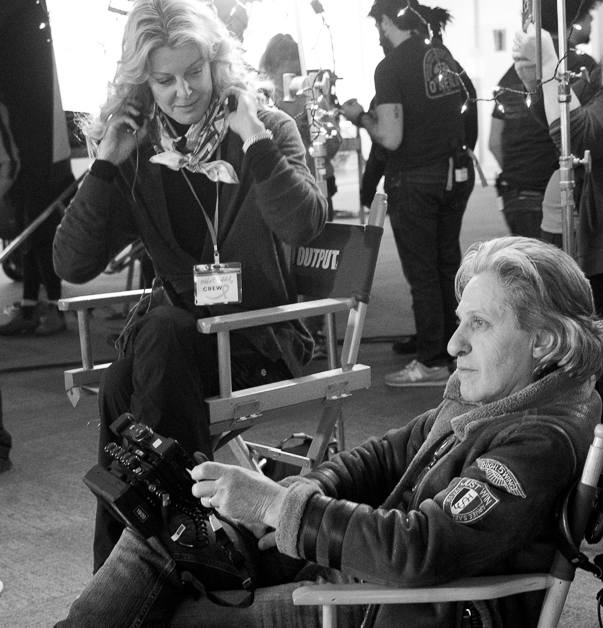
Let’s get to know you both better! Where are you both from and where do you currently reside?
Christine Handy: I am from St. Louis, Missouri. I then moved to Dallas, Texas to go to a college called Southern Methodist University. I ended up staying in Dallas for over 25 years. I raised my two sons there. In 2015, I moved to Miami, Florida to live close to the beach and get a fresh start.
Ziad Hamzeh: I was born in a small farming community south of Damascus, Syria. I immigrated to the United States in 1979 after spending a few years in Paris. Presently, I live near the ocean with my wife and sons about 20 miles north of Boston, Massachusetts.
What are your favorite films, who are your filmmaking idols, and dream collaborators?
Christine Handy: Some of my favorite films are older films. I loved John Candy, so anything with him in it, like Uncle Buck. But I also enjoy watching movies based on true stories, such as The Boys in the Boat and CODA. Recently, I watched Ordinary Angels starring Hilary Swank. It is a story of tragedy and hope, as well as a refreshing reminder of the importance of compassion.
My dream collaborators are those production houses that can take Hello Beautiful to the largest audiences. I believe, with everything that I know to be true, that this film will ignite hope. For that reason, I am deeply committed to continuing to work to reach as large of an audience as possible. There is no limit to what we can accomplish when we believe in ourselves and our projects.
Ziad Hamzeh: As you might imagine, I enjoy many films, admire many filmmakers, and would love to collaborate with some of the legends of our industry. The common denominator is that each honors the essence of humanity – what we are, what we feel, and what we aspire to be… These speak to me; their works inspire me. In truth, every human being I’ve encountered has contributed in some way to my understanding of good storytelling.
In terms of a dream collaborator, that is and always will be my wife. When we were young, she taught me English, and we created The Open Fist Theater together, an oasis in Hollywood for those who shared our passion and collaborative spirit. Forty years later, she is my North Star, my writing partner, challenging me to achieve the honesty and truthfulness I strive for in all my projects.
What is one thing you’ve learned as a filmmaker that you think other filmmakers would benefit from knowing in starting their careers?
Christine Handy: I do not consider myself a filmmaker, although I suppose I have now made one film. When making this film, I couldn’t understand how any films truly get completed. The obstacles seemed so great, not just for small budgets but I imagine for all budgets. I would simply say that quitting should not be an option. Only the ones who stick it out in the difficult messes get it done. So keep going.
Ziad Hamzeh: I have learned countless lessons as a filmmaker, and I’ll share just a few. First, human beings are continually evolving, so we must continue to learn from and with each other. That means listening with an open mind to all opinions and respecting all perspectives. Second, working as a team is important, but nurturing that team so it becomes an ensemble is even better. When your cast and crew know and care about each other, everyone’s experience on set is improved. Third, all egos must be left at the door. Only with kindness and compassion can a unified vision flourish.
What is one message that you would like to share with audiences about your work, your general outlook on life, that you are interested in further showcasing in your films?
Christine Handy: I would describe myself as a hope facilitator. It is not always easy to continuously talk about a story that is rooted in such pain. Yet, by doing so, it can bring a sense of community to a disease that is so isolating. Whether through a book, a film, social media, behind a podium, or even one-on-one, talking about struggles on a very personal and vulnerable level invokes connection. The purpose of this film is to show a very accurate portrayal of a disease that is on the rise. Not to show the disease as hopeless, but to model the importance of people showing up during illness and the truth of the human spirit’s fight to survive. I believe deeply that this film, in particular the ending, has the ability to give tremendous hope.
Ziad Hamzeh: I believe the most valuable stories engage the viewer in the immersive experience of unpacking, scrutinizing, and embracing the human condition. Much of my work is a reflection of who I am, what I value, and how I see the world. I seek to contribute positively through my art even as I dare audiences to look in the mirror, think differently, and choose alternative paths.

